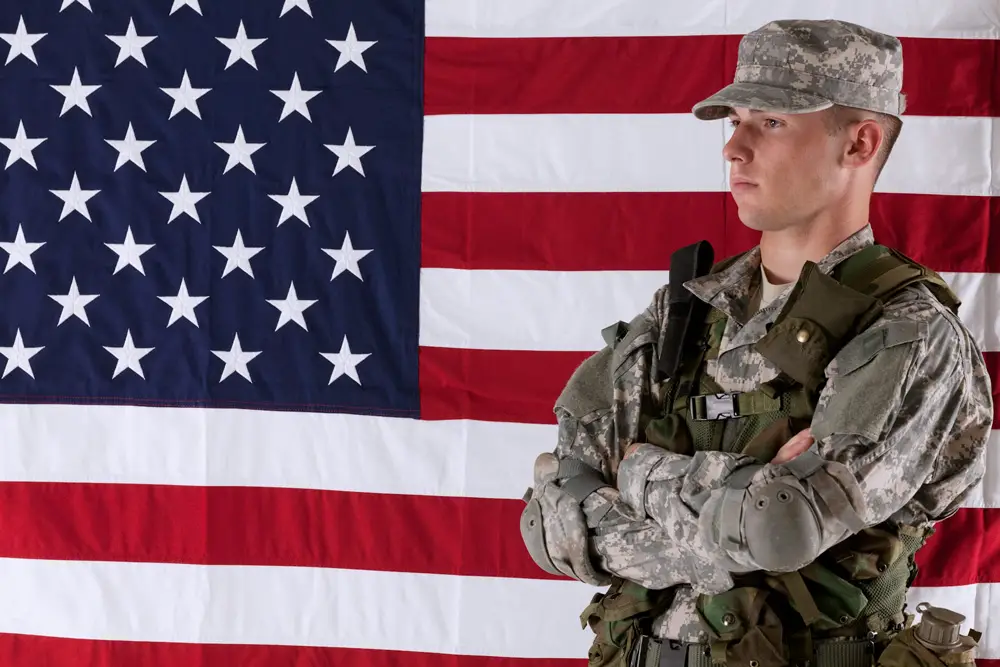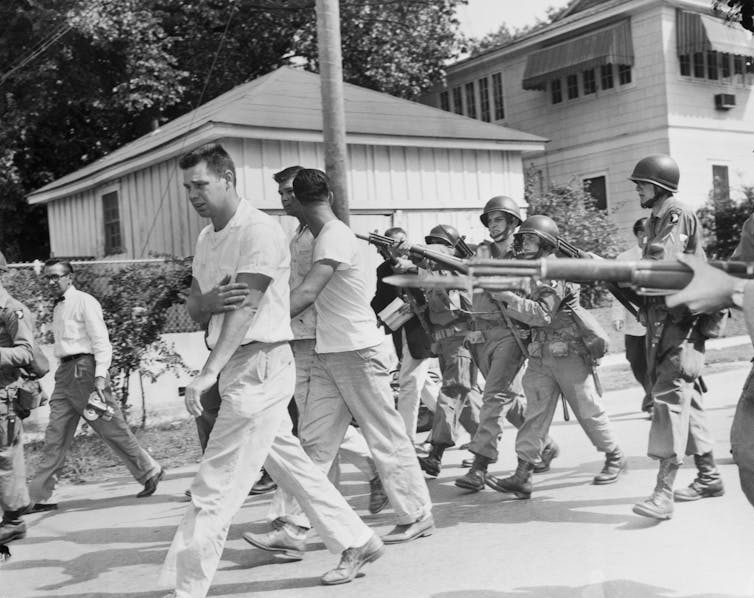
By F. Chris Curran
Every now and then, an elected official will suggest bringing in the National Guard to deal with violence that seems out of control.
A city council member in Washington suggested doing so in 2023 to combat the city’s rising violence. So did a Pennsylvania representative concerned about violence in Philadelphia in 2022.
In February 2024, officials in Massachusetts requested the National Guard be deployed to a more unexpected location – to a high school.
Brockton High School has been struggling with student fights, drug use and disrespect toward staff. One school staffer said she was trampled by a crowd rushing to see a fight. Many teachers call in sick to work each day, leaving the school understaffed.
As a researcher who studies school discipline, I know Brockton’s situation is part of a national trend of principals and teachers who have been struggling to deal with perceived increases in student misbehavior since the pandemic.
A review of how the National Guard has been deployed to schools in the past shows the guard can provide service to schools in cases of exceptional need. Yet, doing so does not always end well.
How have schools used the National Guard before?
In 1957, the National Guard blocked nine Black students’ attempts to desegregate Central High School in Little Rock, Arkansas. While the governor claimed this was for safety, the National Guard effectively delayed desegregation of the school – as did the mobs of white individuals outside. Ironically, weeks later, the National Guard and the U.S. Army would enforce integration and the safety of the “Little Rock Nine” on orders from President Dwight Eisenhower.

Bettmann via Getty Images
One of the most tragic cases of the National Guard in an educational setting came in 1970 at Kent State University. The National Guard was brought to campus to respond to protests over American involvement in the Vietnam War. The guardsmen fatally shot four students.
In 2012, then-Sen. Barbara Boxer, a Democrat from California, proposed funding to use the National Guard to provide school security in the wake of the Sandy Hook school shooting. The bill was not passed.
More recently, the National Guard filled teacher shortages in New Mexico’s K-12 schools during the quarantines and sickness of the pandemic. While the idea did not catch on nationally, teachers and school personnel in New Mexico generally reported positive experiences.
Can the National Guard address school discipline?
The National Guard’s mission includes responding to domestic emergencies. Members of the guard are part-time service members who maintain civilian lives. Some are students themselves in colleges and universities. Does this mission and training position the National Guard to respond to incidents of student misbehavior and school violence?
On the one hand, New Mexico’s pandemic experience shows the National Guard could be a stopgap to staffing shortages in unusual circumstances. Similarly, the guards’ eventual role in ensuring student safety during school desegregation in Arkansas demonstrates their potential to address exceptional cases in schools, such as racially motivated mob violence. And, of course, many schools have had military personnel teaching and mentoring through Junior ROTC programs for years.
Those seeking to bring the National Guard to Brockton High School have made similar arguments. They note that staffing shortages have contributed to behavior problems.
One school board member stated: “I know that the first thought that comes to mind when you hear ‘National Guard’ is uniform and arms, and that’s not the case. They’re people like us. They’re educated. They’re trained, and we just need their assistance right now. … We need more staff to support our staff and help the students learn (and) have a safe environment.”
Yet, there are reasons to question whether calls for the National Guard are the best way to address school misconduct and behavior. First, the National Guard is a temporary measure that does little to address the underlying causes of student misbehavior and school violence.
Research has shown that students benefit from effective teaching, meaningful and sustained relationships with school personnel and positive school environments. Such educative and supportive environments have been linked to safer schools. National Guard members are not trained as educators or counselors and, as a temporary measure, would not remain in the school to establish durable relationships with students.
What is more, a military presence – particularly if uniformed or armed – may make students feel less welcome at school or escalate situations.
Schools have already seen an increase in militarization. For example, school police departments have gone so far as to acquire grenade launchers and mine-resistant armored vehicles.
Research has found that school police make students more likely to be suspended and to be arrested. Similarly, while a National Guard presence may address misbehavior temporarily, their presence could similarly result in students experiencing punitive or exclusionary responses to behavior.
Students deserve a solution other than the guard
School violence and disruptions are serious problems that can harm students. Unfortunately, schools and educators have increasingly viewed student misbehavior as a problem to be dealt with through suspensions and police involvement.
A number of people – from the NAACP to the local mayor and other members of the school board – have criticized Brockton’s request for the National Guard. Governor Maura Healey has said she will not deploy the guard to the school.
However, the case of Brockton High School points to real needs. Educators there, like in other schools nationally, are facing a tough situation and perceive a lack of support and resources.
Many schools need more teachers and staff. Students need access to mentors and counselors. With these resources, schools can better ensure educators are able to do their jobs without military intervention.
![]()
F. Chris Curran is Associate Professor of Educational Leadership and Policy at the University of Florida.





























Samuel L. Bronkowitz says
Kent State.
Joe D says
Not quite supporting the use of National Guard to restore/maintain order and security in schools, other than an emergency short term solution.
The root cause, to me is there has been a general LACK of respect for AUTHORITY ( in ALL aspects of our lives).
Respect is EARNED…and SHOULD be taught at home… but as the former husband of a retired Public Schoolteacher, and the father of a schoolteacher daughter, there is little respect going on much of anywhere.
We can look to our TOP government officials (past and present) who were elected to SERVE the PEOPLE in a democracy ( not the other way around, as in Monarchies and Dictatorships).
Charges of bribery, misappropriation of public funds, LYING about personal behavior, Sexual assault, collusion with foreign powers… YIKES! Any wonder why the general population frequently has no respect for those in authority….so what do we expect our CHILDREN to learn from all this?
I remember as a young adult hearing the joke about the GOLDEN RULE ( originally interpreted to mean that you should treat OTHERS as you would have them treat YOU)…but as the joke goes: it’s been turned into “He who has the GOLD, MAKES the RULES!
How Sad! BUT….in today’s world…HOW TRUE!
TR says
Joe D,You are so right and I agree 100%
JW says
One more suggestion related to school shootings etc.
Make it mandatory for all schools, as part of teaching critical reading skills, to teach students (and their parents) how to correctly read the Second Amendment:
A well regulated Militia, being necessary to the security of a free State, the right of people to keep and bear Arms, shall not be infringed.
Should not be that difficult but……?
JimboXYZ says
It’s gotten to the point where it’s an option. The 16 year old drug dealer (Ocala, FL juvenile) that brought out the handgun at NSB for Spring Break last week. Makes you wonder where he acquired 1. the gun & 2. the gym bag full of drugs. Was it the six degrees of drug cartel provided firearm, border crisis related drug mule marijuana or a local Ocala, FL grown agricultural crop ? America has gotten to the point that a day at the beach, anywhere Spring Break and there’s at least one village idiot that has infiltrated the crowd to make the moment & location unsafe to even sun one’s self on the beach.
dave says
Well if , the parents would do their job, a lot of these fights in schools wouldn’t be occurring. Weak parents equal out of control children., There is no discipline these days at home or even at school and our court system is even weaker. with slap on the wrist and little Johnny will be ok. Its not working. Police arrest these troublemakers in schools and the “juvenile court”, let them out. No deterrents at all.
Pogo says
@F. Chris Curran (and FL)
I wish we did live in a perfect world. We don’t.